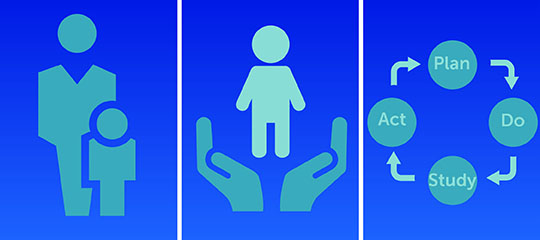Child welfare is a vital aspect of public health, safety, and well-being. Child maltreatment not only does major physical, emotional, and educational harm to children and their families, but it affects state policies, programs, and budgets as agencies struggle to meet the needs of the more than 7 million children involved in reports to child protective services each year.
High quality data analytics and evaluation can help child welfare agencies determine when and how to intervene with at-risk families and can support efficient and effective program operations. But resource-strapped agencies don’t always have the time or expertise to use the data at their disposal.
Mathematica Policy Research’s work brings evaluation, data quality, and analytics to the forefront. We are proud to partner with federal, state, and local agencies and with philanthropic organizations to support data-informed policies and programs that improve services for children and their families.
Reaching Those at Risk
Mathematica’s work is shedding light on the evolving child welfare landscape and the promise of approaches designed to improve outcomes. A few examples of our projects follow:
- Under a contract recently awarded by the Administration for Children and Families (ACF), Mathematica will use a continuous quality improvement approach to help the child welfare system better engage fathers and other paternal relatives.
- In partnership with JBS International, we are part of the National Quality Improvement Center for Preventive Services and Interventions in Indian Country conducting rigorous multisite evaluations of child welfare interventions with Tribal populations to reduce child maltreatment in American Indian/Alaska Native communities.
- To address the threat of intergenerational substance abuse, we are continuing our efforts to provide technical assistance to grantees of the Regional Partnership Grant program. These grantees support families in which a child is in, or at risk of, out-of-home placement because of parental or caretaker substance abuse.
Support When and Where It’s Needed
In other new contracts for ACF, Mathematica is working to help build the evidence base and to inform policy and program decisions at critical junctures. Below are examples of our work:
- On the front end of child welfare systems, we are partnering with Child Trends to develop analytic files to document variability in definitions and policies related to the reporting and investigation of child abuse and neglect, which can be linked with other data to assess how this variability affects incidence of child maltreatment, as well as intake, screening, services, and children’s safety and well-being.
- Mathematica is also exploring the feasibility of linking administrative data to better understand child maltreatment incidence, which may provide insight into confirmed, unconfirmed, and unreported cases of abuse and neglect.
- We are also working with RTI International to study child welfare policies and procedures regarding post-adoption and guardianship instability for children and youth who exit foster care.
- We continue for a fifth year our ongoing technical assistance in support of state grantees that are implementing innovative service models for youth involved in child welfare who are at risk of homelessness after exit from care.
Mathematica’s understanding of child welfare systems and its wealth of experience conducting evaluations and obtaining, linking, and analyzing administrative records from these systems is helping federal, state, and local agencies optimize their services and make a difference in the lives of America's children. Read more about Mathematica’s work in child welfare.

